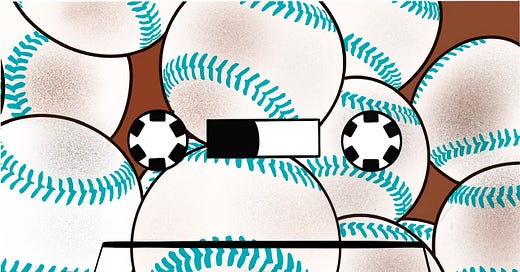Matt’s Mix Tape, Vol. 115
Hi, I’m Matt Tillotson, and this is Matt’s Mix Tape: essays + links on living a vibrant and creative middle life.
This week’s Mix:
Mix Tape logo: baseball’s glass houses
You can’t do it like they did it
The best books on writing
What do I know about fitness, anyway
Florida photo
Baseball’s glass houses
I’m pretty good (meaning bad) at holding grudges. But some baseball fans have made it an art form.
The Houston Astros are in the World Series. In 2017, the team was busted for an elaborate sign-stealing scheme which tipped off hitters to particular pitches by clanging garbage can lids.
Four years latter, people are still mad online.
Baseball’s history—even recent history—is rife with cheating and bad behavior. Steroid scandals. Cocaine scandals. Rampant amphetimine (“greenies”) usage. The all-time hits leader bet on games he managed. Pitchers using foreign substances on the ball. On and on it goes.
Your team, in all likelihood, has done shady stuff, also.
That doesn’t excuse what the Astros did four years ago. But it adds context. The 2021 Astros—sans garbage can clanging—are fun to watch.
Here’s why you should just let 2017 be history and enjoy watching the super-talented Astros.
You can’t do it like they did it
Morgan Housel, on measuring your success against others:
It’s hard to know how much of some external benchmarks owe their performance luck, which you cannot replicate no matter how smart you are or how hard you try.
Housel is referring to business growth and investing, but the same holds true of creative output. Learn from others, take pieces of what they do, and blend it into your own work. But also realize you aren’t getting where they are by doing what they did.
At the same time, Housel also doesn’t dismiss external benchmarks entirely:
External benchmarks can be great because so much innovation comes from the urge to chase whoever’s in front of you.
So sure, external benchmarks can help us advance. But ultimately, it’s healthier and more authentic—to walk our own creative path.
The best books on writing
Alex Wieckowski put together a Twitter thread of the 20 greatest books on writing. (Sadly, I’ve only read 8 of the 20. So far.):

Alex included my sleeper selection on his list. Chuck Palanhniuk’s “Consider This” is an entertaining and insightful book primarily about writing fiction—but it applies to all kinds of creative work.
I created a couple of shortcut resources for “Consider This:”
Stephen King’s “On Writing” is a book people often reference, and I like that book, also. I just like Palanhniuk’s more.
What do I know about fitness, anyway
Nothing, really, outside my own experience.
So here are some counter-arguments to my usual mantras (strength train, don’t do so much cardio, walk, sprint, and prioritize protein.)
First, Daniel Duane says various economic classes value types of exercise differently:
Carl Stempel, for example, writing in the International Review for the Sociology of Sport, argues that upper middle class Americans avoid “excessive displays of strength,” viewing the bodybuilder look as vulgar overcompensation for wounded manhood. The so-called dominant classes, Stempel writes—especially those like my friends and myself, richer in fancy degrees than in actual dollars—tend to express dominance through strenuous aerobic sports that display moral character, self-control, and self-development, rather than physical dominance
Physique as an indicator of economic status. Interesting.
Secondly, if you think I’m dead wrong about not doing lots of cardio, then you should follow my sister Sara Plumstead on IG.
Sara’s a certified running coach, and just finished as the second overall female at Grand Rapids marathon. Amazing.
This week’s Florida photo
Kinda spooky-ish, I guess, for Halloween? Florida style. My wife took this one.
Hello to 14 new subscribers
And thank you to you for reading. Drop me a note, ask a question, or make a suggestion anytime.
(And Go Green.)






